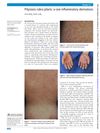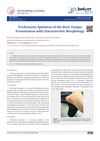 3 citations,
July 2017 in “Current sports medicine reports”
3 citations,
July 2017 in “Current sports medicine reports” Athletes can experience various skin issues, which can be treated and prevented with appropriate care and protective measures.
 February 2018 in “BMJ case reports”
February 2018 in “BMJ case reports” An 18-year-old woman was diagnosed with a rare skin condition called Pityriasis rubra pilaris.
 2 citations,
May 2023 in “International Journal of Molecular Sciences”
2 citations,
May 2023 in “International Journal of Molecular Sciences” The TRPV3 ion channel is important for skin and hair health and could be a target for treating skin conditions.
5 citations,
January 2015 in “Case reports in medicine” A baby was diagnosed with IFAP syndrome due to a new genetic mutation, showing severe skin and developmental issues.
 41 citations,
January 2011 in “Nippon Ishinkin Gakkai Zasshi”
41 citations,
January 2011 in “Nippon Ishinkin Gakkai Zasshi” Tinea incognito in Iran commonly affects adults and mimics other skin conditions.
 5 citations,
November 2007 in “British journal of nursing”
5 citations,
November 2007 in “British journal of nursing” Nurses should treat emollients as medications, understanding their use and effects for treating skin conditions.
 7 citations,
April 2021 in “Dermatology and Therapy”
7 citations,
April 2021 in “Dermatology and Therapy” H-1 antihistamines may help with various skin conditions, but more research is needed to confirm their effectiveness.
 7 citations,
July 2019 in “International archives of internal medicine”
7 citations,
July 2019 in “International archives of internal medicine” Common skin conditions can greatly affect a person's mental health and social life.
 July 2015 in “British Journal of Dermatology”
July 2015 in “British Journal of Dermatology” Treating skin conditions with both psychological and dermatological care improves patient outcomes and can save costs.
 32 citations,
April 2000 in “Dermatologic Clinics”
32 citations,
April 2000 in “Dermatologic Clinics” Skin diseases, especially psoriasis, greatly affect people's quality of life, similar to chronic diseases.
 28 citations,
January 2018 in “Biochemical Society Transactions”
28 citations,
January 2018 in “Biochemical Society Transactions” Certain fats in the skin help control inflammation and health, and changing these fats through diet or supplements might treat skin inflammation.
 13 citations,
April 2017 in “Journal of Alternative and Complementary Medicine”
13 citations,
April 2017 in “Journal of Alternative and Complementary Medicine” Traditional and complementary medicine may help with skin conditions, but more high-quality research is needed.
 September 2014 in “Journal der Deutschen Dermatologischen Gesellschaft”
September 2014 in “Journal der Deutschen Dermatologischen Gesellschaft” Diabetes can cause a variety of skin disorders, some of which may signal more serious health issues.
 63 citations,
April 2018 in “Journal of the American Academy of Dermatology”
63 citations,
April 2018 in “Journal of the American Academy of Dermatology” Topical JAK inhibitors may help treat some skin conditions but need more research.
 12 citations,
January 2015 in “Indian Journal of Dermatology, Venereology and Leprology”
12 citations,
January 2015 in “Indian Journal of Dermatology, Venereology and Leprology” Negative expectations can cause adverse effects in dermatology treatments, like with finasteride for baldness, and careful communication can help reduce these nocebo responses.
 12 citations,
October 2018 in “International Journal of Women's Dermatology”
12 citations,
October 2018 in “International Journal of Women's Dermatology” Hormone therapy in transgender women can affect hair growth and acne, and there are specific skin issues related to gender-affirming surgery, but more research is needed on their dermatological health.
 April 2024 in “Frontiers in cellular and infection microbiology”
April 2024 in “Frontiers in cellular and infection microbiology” Blue light might help treat skin conditions by affecting the skin's bacteria.
 306 citations,
April 2019 in “International Journal of Molecular Sciences”
306 citations,
April 2019 in “International Journal of Molecular Sciences” The skin has a complex immune system that is essential for protection and healing, requiring more research for better wound treatment.
 May 2020 in “JOJ Dermatology & Cosmetics”
May 2020 in “JOJ Dermatology & Cosmetics” A rare skin condition usually on the face was found on a man's heel.
 15 citations,
September 2018 in “Dermatologic therapy”
15 citations,
September 2018 in “Dermatologic therapy” Both emollients effectively reduced itching and improved skin moisture in xerotic eczema.
 53 citations,
January 2017 in “Skin appendage disorders”
53 citations,
January 2017 in “Skin appendage disorders” Botulinum toxin shows promise for various skin conditions but requires more research for confirmation and standardized use.
 June 2023 in “British Journal of Dermatology”
June 2023 in “British Journal of Dermatology” Leprosy and psoriasis were historically confused, but were finally distinguished as separate diseases in the 1800s.
 July 2018 in “Elsevier eBooks”
July 2018 in “Elsevier eBooks” Acne keloidalis nuchae is a chronic skin condition more common in African men, causing itchy or painful bumps and can lead to permanent hair loss if not treated early.
 39 citations,
April 2011 in “International Journal of Dermatology”
39 citations,
April 2011 in “International Journal of Dermatology” Skin diseases are very common in poor areas, and there's a need for affordable ways to manage and improve skin health.
 15 citations,
September 1984 in “Veterinary Clinics of North America: Small Animal Practice”
15 citations,
September 1984 in “Veterinary Clinics of North America: Small Animal Practice” The document explains various skin conditions in cats and how to diagnose and treat them.
 70 citations,
May 2014 in “JAMA Dermatology”
70 citations,
May 2014 in “JAMA Dermatology” The representation of skin conditions in medical reviews partly matches their real-world impact.
 293 citations,
November 2005 in “Trends in Immunology”
293 citations,
November 2005 in “Trends in Immunology” Stress can worsen skin conditions and stop hair growth by affecting the body's stress response system.
 April 2019 in “The journal of investigative dermatology/Journal of investigative dermatology”
April 2019 in “The journal of investigative dermatology/Journal of investigative dermatology” Keloids significantly reduce quality of life, and treating symptoms should be prioritized.
 405 citations,
May 2007 in “Journal of The American Academy of Dermatology”
405 citations,
May 2007 in “Journal of The American Academy of Dermatology” Obesity affects skin health, causing conditions like acanthosis nigricans and may require different treatment approaches.
 434 citations,
October 2003 in “PTR. Phytotherapy research/Phytotherapy research”
434 citations,
October 2003 in “PTR. Phytotherapy research/Phytotherapy research” Natural products in cosmetics are beneficial for skin and hair care with low toxicity.





























